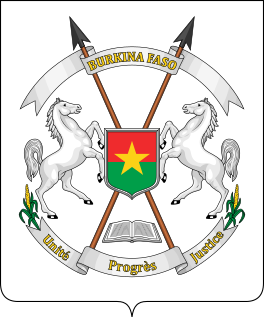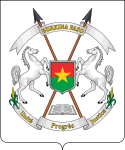
The Politics of Burkina Faso takes place in a framework of a semi-presidential republic, whereby the Prime Minister of Burkina Faso is the head of government, and of a multi-party system. The President of Burkina Faso is the head of state. Executive power is exercised by both the President and the Government. Legislative power is vested in both the government and parliament. The party system was dominated by the Congress for Democracy and Progress (CDP) until the 2014 Burkinabé uprising. Since then, the CDP has lost influence. The Judiciary is independent of the executive and the legislature. The Economist Intelligence Unit rated Burkina Faso as a "hybrid regime" in 2016.

The history of Burkina Faso includes the history of various kingdoms within the country, such as the Mossi kingdoms, as well as the later French colonisation of the territory and its independence as the Republic of Upper Volta in 1960.

Elections in Burkina Faso gives information on election and election results in Burkina Faso.

Parliamentary elections were held in Burkina Faso on 6 May 2007. The result was a victory for the ruling Congress for Democracy and Progress (CDP), which won 73 of the 111 seats in the National Assembly.
Thomas Sanon is a Burkinabé politician and former diplomat who has been President of the Economic and Social Council of Burkina Faso since 2003. Under President Blaise Compaoré, Sanon previously held various positions in the government and was an ambassador.
The Rally for the Development of Burkina was a political party in Burkina Faso led by Celestin Saidou Compaoré.
Simon Compaoré is a Burkinabé politician who served as Mayor of Ouagadougou, the capital of Burkina Faso, from 1995 to 2012. He was a prominent member of the ruling Congress for Democracy and Progress (CDP), but he left the CDP and participated in the formation of the opposition People's Movement for Progress (MPP) in 2014. Following the MPP's victory in the 2015 election, he was appointed to the government. He has served as Minister of State for Internal Security since January 2016, and he also held the ministerial portfolio for territorial administration from January 2016 to February 2017.
Alain Bédouma Yoda is a Burkinabé politician. He served in the government of Burkina Faso as Minister of Transport and Tourism from 1997 to 2000, Minister of Trade from 2000 to 2002, Minister of Health from 2002 to 2008, and Minister of State for Foreign Affairs and Regional Cooperation from 2008 to 2011. He was President of the Parliamentary Group of the Congress for Democracy and Progress (CDP) from 2013 to 2014.
Bognessan Arsène Yé is a Burkinabé politician who was President of the Assembly of People's Deputies of Burkina Faso from 1992 to 1997, President of the Congress for Democracy and Progress (CDP) from 1996 to 1999, and a Minister of State from 1997 to 2000. He was appointed as Minister of State for Relations with Parliament and Political Reform in April 2011.
Kanidoua Naboho is a Burkinabé politician who served as First Vice-President of the National Assembly of Burkina Faso until 2014. He was previously a minister in the government during the late 1980s and early 1990s.

Parliamentary elections were held in the Republic of Upper Volta on 20 December 1970, following the restoration of multi-party democracy in a referendum earlier in the year. The result was a victory for the former sole legal party, the Voltaic Democratic Union-African Democratic Rally, which won 37 of the 57 seats in the National Assembly. Voter turnout was 48.3%.

Parliamentary elections were held in Burkina Faso on 11 May 1997, after the National Assembly completed its first full term since independence. The result was a victory for the Congress for Democracy and Progress, which won 101 of the 111 seats in the National Assembly. Voter turnout was just 44.1%.

Parliamentary elections were held in Burkina Faso on 2 December 2012. They were the first elections held since the National Assembly dissolved the National Electoral Commission in 2011, following fraud allegations concerning the 2010 presidential elections. Municipal elections for over 18,000 councillors were held simultaneously. The elections were held amidst a period of political uncertainty, following protests against President Blaise Compaore's regime.

General elections were held in Burkina Faso on 29 November 2015. The elections were the first national elections in the country since the 2014 Burkinabé uprising and the departure of President Blaise Compaoré, who had ruled Burkina Faso for 27 years. The party of former President Compaoré, the Congress for Democracy and Progress, was banned from running a presidential candidate but was still able to participate in the parliamentary election.

The National Convention of Progressive Patriots–Social Democratic Party was a political party in Burkina Faso led by Pierre Tapsoba.

The Union for Progress and Reform is a political party in Burkina Faso. The party describes itself as non-ideological.
The New Alliance of Faso is a social democratic political party in Burkina Faso.






